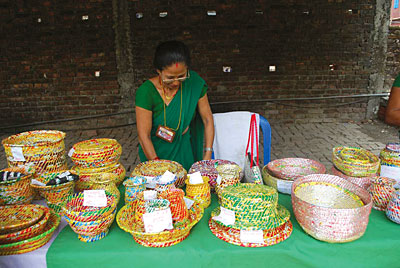 SITA MADEMBA |
"I would mop the house, collect the garbage, and hurl it through the window onto the road or the open space in front of my house, thinking that my house was now clean. These days I collect the garbage from the road as it brings me cash," says Nirmala Shakya, vice president of the Tole Environment Improvement Group in Dharan.
Shakya, a housewife, has been involved in a clean environment campaign for eight years, ever since she received training in waste management and composting. She does not use plastic bags and takes a jute bag with her when she goes shopping. She collects food wrappers to weave them into dhaki, dustbins, bags, and purses. She has dug two pits in her backyard to prepare compost from degradable household waste. Her group, which has 105 members, runs a recycling factory.
Purna Kala Limbu chairs the Srijansheel Environment Women Group, which has recently built toilets for 51 households with the objective of making their area open-defecation free, in collaboration with Dharan Municipality. Says Limbu, "We use jute bags with the message 'don't use plastic bags' printed on them."
Tetra Environment Group has 503 women as members, and has launched an awareness campaign against littering. President Dan Kumari Maskey explains that the group also prepares compost.
Radha Gahatraj of Manakamana Environment Group has been making cash out of trash, too. She weaves bags and dhaki from food wrappers, and uses the money from sales for the group's campaigns � and sometimes to buy vegetables too.
There are 33 environmental groups in Dharan, with about 3,500 members. One member of each group is represented in the Dharan Municipality Environment Coordination Committee. The committee buys the garbage collected by these women's groups, though garbage collection has been hampered by a shortage of manpower.
The coordination committee has an inspection team that monitors the city, and with the help of the women's groups has become more effective. Shishir Shrestha of the Dharan Municipality Environment and Social Welfare Division says the areas where such groups are active are clean.
About 40 tonnes of garbage are generated daily in Dharan, half of which is dumped into the Seuti River. The municipality has four garbage collection vehicles and sixty workers, and spends about Rs 10 million rupees annually. "Women's environment groups have been doing what the municipality should have been doing," Shrestha says.


